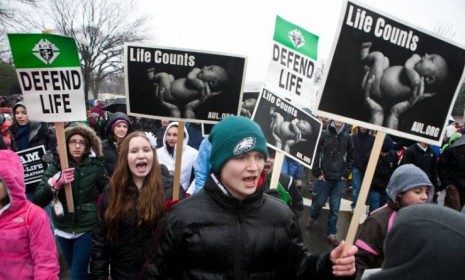Why a 'record low' number of Americans are 'pro-choice': 5 theories
Gallup reveals a surprising drop in the number of people who call themselves "pro-choice," even as more Americans back gay marriage and the legalization of pot

Gallup has released its annual poll of Americans' views on abortion rights, and the headline number made quite a stir: Half of respondents called themselves "pro-life," just shy of the record 51 percent from May 2009, while a "record-low 41 percent" identified themselves as "pro-choice." When Gallup first asked people to choose between those two labels in 1995, "pro-choice" was at its high-water mark of 56 percent and "pro-life" was at 33 percent. This isn't the only new poll raising eyebrows, and the others don't exactly paint the U.S. as increasingly socially conservative: In a Washington Post/ABC News poll, a record-high 53 percent of Americans say same-sex marriage should be legal, versus a record-low 39 percent who want it illegal; Gallup has also found that 89 percent of people think birth control is "morally acceptable" (including 82 percent of Catholics); and Rasmussen even found a new high of 56 percent of likely voters supporting legalizing and regulating the sale of marijuana. So, what's going on with America and abortion?
1. Support for abortion rights is dropping
Why not take the poll at face value? asks Ed Morrissey at Hot Air. "We are seeing a societal shift in attitudes on abortion." More and more Americans, especially independents and Democrats, are coming to see abortion as "barbaric." That's largely due to "sonograms, science, and real-life experience with abortion," says W. James Antle III at The American Spectator, all of which make it "harder to reconcile choice with the reality of the act being chosen." Yup, "we pro-lifers are clearly winning the battle," says Donald McClarey at The American Catholic. With the media, Hollywood, and academia "stacked against us," that's a miracle, "but we are a cause that believes in miracles."
The Week
Escape your echo chamber. Get the facts behind the news, plus analysis from multiple perspectives.

Sign up for The Week's Free Newsletters
From our morning news briefing to a weekly Good News Newsletter, get the best of The Week delivered directly to your inbox.
From our morning news briefing to a weekly Good News Newsletter, get the best of The Week delivered directly to your inbox.
2. This poll is probably just a fluke
Here's what this poll means: "Probably nothing at all," says Ed Kilgore at Washington Monthly. The last time Gallup's abortion findings got so much attention was in 2009, when "pro-life" hit 51 percent and "pro-choice" 42 percent. Other than that "strange finding in 2009," and this "inexplicable" blip, the polling has been unusually stable for the past decade and a half, closer to the 2011 results: 49 percent "pro-choice," 45 percent "pro-life." That means this poll, like the 2009 numbers, "is likely an outlier."
3. Conservatives are winning the branding war
The buzzwords matter, says Melissa McEwan at Shakesville. With their amazing knack for "demonizing language," conservative strategists have "turned 'pro-choice' toxic in much the same way they did 'liberal.'" Abortion-rights supporters have a lot of work to do. Actually, this shift is mostly about semantics, says Steve Benen at The Maddow Blog. When you look past the headline numbers, our views on the legality of abortion are pretty much unchanged: 25 percent say it should always be legal, 20 percent say it should never be legal, and 52 percent say it should be legal sometimes. Those "fundamental views matter more than vague buzzwords."
A free daily email with the biggest news stories of the day – and the best features from TheWeek.com
4. Americans don't think abortion rights are imperiled
In May 2009, the "pro-life" high point, "pro-choice Barack Obama" had just taken office, says Steve M. at No More Mister Nice Blog; in May 2011, when "pro-choice" was back on top, "the overwhelmingly anti-abortion GOP class of 2010" had started rolling back reproductive rights at the state level. The majority of Americans are somewhere in the middle on abortion, and their self-labeling shifts with the political tides. Lesson: People support abortion rights when those rights are threatened. So "what's going on now?" According to polls, "Americans think Obama will be president for four more years, therefore abortion rights aren't threatened."
5. It's a generational thing
There has been a slight shift "toward a more pro-life position in the last decade or so," including in "the younger generation," says Andrew Sullivan at The Daily Beast. People are becoming more attuned to the moral questions involved in abortion, while staying firm on the legal issues. For example, "I don't want to criminalize abortion in the first trimester, but if I had to describe myself, I'd probably say 'pro-life.'" Yes, there's "an increasingly expansive view of what pro-life means," especially among younger members of the pro-abortion-rights side, says Sarah Kliff at The Washington Post. "Pro-choice" dates back to the 1970s, and "a label developed 40 years ago might not speak to abortion-rights supporters in a way it did for previous generations."
-
 The best dark romance books to gingerly embrace right now
The best dark romance books to gingerly embrace right nowThe Week Recommends Steamy romances with a dark twist are gaining popularity with readers
-
 The ocean is getting more acidic — and harming sharks’ teeth
The ocean is getting more acidic — and harming sharks’ teethUnder the Radar ‘There is a corrosion effect on sharks’ teeth,’ a study’s author said
-
 6 exquisite homes for skiers
6 exquisite homes for skiersFeature Featuring a Scandinavian-style retreat in Southern California and a Utah abode with a designated ski room
-
 The billionaires’ wealth tax: a catastrophe for California?
The billionaires’ wealth tax: a catastrophe for California?Talking Point Peter Thiel and Larry Page preparing to change state residency
-
 Bari Weiss’ ‘60 Minutes’ scandal is about more than one report
Bari Weiss’ ‘60 Minutes’ scandal is about more than one reportIN THE SPOTLIGHT By blocking an approved segment on a controversial prison holding US deportees in El Salvador, the editor-in-chief of CBS News has become the main story
-
 Has Zohran Mamdani shown the Democrats how to win again?
Has Zohran Mamdani shown the Democrats how to win again?Today’s Big Question New York City mayoral election touted as victory for left-wing populists but moderate centrist wins elsewhere present more complex path for Democratic Party
-
 Millions turn out for anti-Trump ‘No Kings’ rallies
Millions turn out for anti-Trump ‘No Kings’ ralliesSpeed Read An estimated 7 million people participated, 2 million more than at the first ‘No Kings’ protest in June
-
 Ghislaine Maxwell: angling for a Trump pardon
Ghislaine Maxwell: angling for a Trump pardonTalking Point Convicted sex trafficker's testimony could shed new light on president's links to Jeffrey Epstein
-
 The last words and final moments of 40 presidents
The last words and final moments of 40 presidentsThe Explainer Some are eloquent quotes worthy of the holders of the highest office in the nation, and others... aren't
-
 The JFK files: the truth at last?
The JFK files: the truth at last?In The Spotlight More than 64,000 previously classified documents relating the 1963 assassination of John F. Kennedy have been released by the Trump administration
-
 'Seriously, not literally': how should the world take Donald Trump?
'Seriously, not literally': how should the world take Donald Trump?Today's big question White House rhetoric and reality look likely to become increasingly blurred